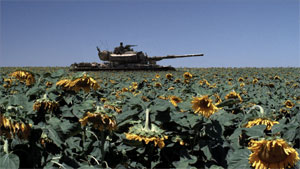Arts
Personality
Film Q&A: Discussion with Samuel Maoz
Samuel Maoz was 20 years old when he killed a man for the first time in his life, on the morning that ushered in the First Lebanon War. Twenty-five years later, still suffering from post-traumatic stress disorder, he hit rock bottom, personally, professionally and financially. He had made numerous attempts to exorcise his demons by turning his experiences into a screenplay, but delving into that awful morning had invariably evoked only the smell of charred flesh and subsequent flights into denial.
“When a person feels he has nothing to lose, he takes chances,” Maoz says of the moment he no longer wanted to run from the smell; when he wanted to let it take him to the indistinct, blurry scenes he had buried deep in his subconscious. “I wrote Lebanon straight from my gut. Scripting conventions did not concern me. I wrote what I felt.”
Maoz wanted to tell the story of a slaughtered soul, a story derived not from the body of a plot but from a living experience that actors and audience alike would go through together. Says Maoz, “I asked myself, how can you tell what happens inside a soldier during the war? I understood the only way to understand is not through the head but through the stomach, the heart.” To generate the necessary sense of terror in his young actors from Tel Aviv, Maoz would lock them inside a blazing hot container for hours, striking the walls with iron bars to simulate artillery fire. Instead of employing dialogue to convey to the audience the anguish of killing another human being, Maoz puts them in the gunner’s point of view, staring down the crosshairs directly into their victim’s eyes. The result is a claustrophobic, maddening, visceral cognition of the horrors of spilling the blood of another human being.

With one exception—the sunflower field—Lebanon was shot entirely in Tel Aviv, exterior battle and interior tank scenes alike. Maoz filmed exteriors in an old factory; the interior tank shots were created on set, in a sheet metal shell outfitted with a system of beating, vibrating pipes to convey the notion of a “bloodstream” and paraphernalia scavenged from an IDF tank abandoned near Ramat Hagoran, a by-blow of bureaucratic incompetence. Building the tank took up most of the budget, so the special effects were created by actors and crew. “In one very complicated shot, we had one guy blowing smoke, another throwing dust, another dripping oil, four guys shaking the tank up and down, four moving it from side to side,” he recalls, laughing.
The hardest role, however, belonged to the director of photography. A cameraman normally has a starting point and an ending point for each shot, but Maoz wanted DP Giora Bejach to mimic the haphazard movements of an inexperienced gunner in order to heighten the audience’s understanding of the terror the gunner felt under such intense pressure. Says Maoz, “Giora had to imitate the combination of the movement of the tank, the gunner’s inexperience with tracking a subject, and the terrified shaking of the gunner’s hand. It was like asking him to be a bad cameraman. It worked against his instinct.”
While the general reaction to Lebanon in Israel was more positive then negative, it seems to have split along generational lines—the younger the audience, the more positive the reaction. “I can understand it,” says Maoz. “When the older generations—our parents, our teachers—had their wars, they really felt that everyone wanted to terminate them. They felt this was their only choice. That’s what gave them the motivation, and they won against all odds. When my generation had its war, it was so-so. But when the new generation—the global generation, the Google generation, had their war, they lost even though they had the best technology and equipment because they didn’t have the motivation to fight anymore. That’s why the reaction of the young generation to the film is positive, because they really don’t think that we must continue to fight.”
There was no official screening for the IDF, and the Army did not lend their help in making the film, but according to Maoz, they were not against the film. “Before they were generals or officers they were human beings,” says Maoz, “and they felt the same inside. I have lots of e-mails from soldiers who wrote, ‘Thank you for helping us express ourselves,’ and from wives who said, ‘Now I understand.’ So in the end, there was no official reaction from the army but there were positive reactions from people. But remember: I am the director, so if someone has something negative to say, they won’t say it to me.”
For a review of Lebanon, click here.










 Facebook
Facebook Instagram
Instagram Twitter
Twitter
Leave a Reply